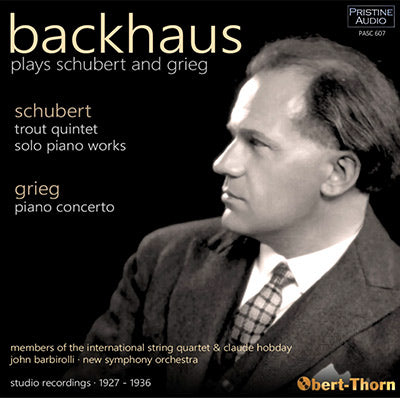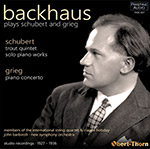
This album is included in the following sets:
This set contains the following albums:
- Producer's Note
- Full Track Listing
- Cover Art
While Schubert and Grieg may seem to make odd discmates, there is a rationale for their coupling here. This release brings back into circulation all of Backhaus’ pre-war electrical Schubert recordings (save for two transcriptions which appeared on a recent APR CD set), several of which have not been available on CD for nearly two decades, along with his only complete recording of the Grieg concerto, which has otherwise been unavailable except for its appearance on the new 109-CD Barbirolli “Complete Warner Recordings” set.
During the acoustic era, Backhaus recorded only two Schubert sides – Liszt’s transcription of “Horch, horch, die Lerch” and the F minor Moment Musical. With the coming of the 1928 centennial of Schubert’s death, several more titles were added. The “Trout” Quintet was Backhaus’ only chamber recording of the 78 era. A contemporaneous interview in The Gramophone suggests why he didn’t do more, as the pianist referred to “repeated attempts [which] had to be made before satisfaction was obtained” for this recording. Some sides required as many as five takes over two sessions before the recording could be completed; but the struggle is not apparent in the ebullient performance which was ultimately released. The Gramophone critic of the original release was certainly impressed: “Remarkable is the flexibility of Backhaus’s playing. Never have I heard so gentle, warm – I would almost like to say musical – playing by this great pianist. He gives the performance its significance.”
For Backhaus’ first solo Schubert recording of the electrical era in 1927, he returned to the F minor Moment Musical, which was coupled with Schumann’s “Traumes Wirren” on the same side. That recording, made in the cavernous acoustic of Queen’s Hall at a very low volume level which was overwhelmed by shellac crackle of HMVs pressings of that era, only stayed in the catalog a brief period before it was replaced. The 1928 remake, made in a smaller venue with much closer miking, begins with a more staccato approach than the earlier version, showing how Backhaus’ interpretation could vary even in such a relatively short period. The earlier version is something of a rarity, even on reissues, and we are pleased to be able to present it back-to-back with the remake for comparison.
“Backhaus may seem a curious choice for the Grieg, when we remember his solidity,” wrote W.R.A. in the Gramophone review of the concerto; and indeed, when one thinks of the repertoire with which the pianist was associated on records from the early 1930s onward (mainly German Classics and Romantics), this composer stands out as an exception. Yet, Backhaus’ repertoire was more far-ranging in his early days than it was later to become. With Grieg, his association went back to a recording of the “Norwegian Bridal Procession” made at one of his first sessions in 1908, a year after the composer’s death. The following year, he was the soloist in what is considered to be the earliest piano concerto recording – the Grieg, in a highly-truncated version on two sides, with only the first and last movements presented. The 1933 recording presented here displays an idiomatic naturalness, with Barbirolli providing spirited accompaniment.
The sources for the transfers were exceptionally quiet Austrialian HMV “Homebush” pressings for the quintet, British HMVs for the solos, and an American Victor “Z” pressing for the concerto.
Mark Obert-Thorn
WILHELM BACKHAUS plays SCHUBERT & GRIEG
SCHUBERT Piano Quintet in A major ‘Trout’, Op. 114, D667
1. 1st Mvt. – Allegro vivace (9:01)
2. 2nd Mvt. – Andante (6:57)
3. 3rd Mvt. – Scherzo: Presto (2:43)
4. 4th Mvt. – Andantino (6:12)
5. 5th Mvt. – Finale: Allegro giusto (6:37)
Members of the International String Quartet (André Mangeot,violin; Frank Howard, viola; Herbert Withers, cello) and Claude Hobday, double bass
Recorded 7 March & 18 June 1928 in Small Queen’s Hall, London∙
Matrices: Cc 12811-3A, 12812-5A, 12813-3, 12814-3, 12815-4, 12816-2A,
12817-5, 12818-2A ∙ First issued on HMV DB 1484/7
6.
SCHUBERT Menuetto from Piano Sonata in G major, Op. 78, D894
(4:10)
Recorded 18 June 1928 in Small Queen’s Hall, London ∙ Matrix: Cc
12401-6 ∙ First issued on HMV DB 1195
7. SCHUBERT Moment musical in F minor, Op. 94, No. 3, D780
(1:42)
Recorded 28 January 1927 in Queen’s Hall, London ∙ Matrix: CR 958-2A ∙
First issued on HMV DB 1033
8. SCHUBERT Moment musical in F minor, Op. 94, No. 3, D780
(1:36)
9. SCHUBERT Impromptu in B flat major Op. 142, D935 (7:14)
Recorded 4 January 1928 in Small Queen’s Hall, London ∙ Matrices: Cc
12189-2 & 12190-2 ∙ First issued on HMV DB 1126
10.
SCHUBERT Moment musical in A flat major, Op. 94, No. 6, D780
(4:44)
Recorded 27 January 1936 in Abbey Road Studio No. 3, London ∙ Matrix:
2EA 3026-3 ∙ First issued on HMV DB 2809
GRIEG Piano Concerto in A minor, Op. 16
1. 1st Mvt. – Allegro molto moderato (12:15)
2. 2nd Mvt. – Adagio (4:51)
3. 3rd Mvt. – Allegro moderato molto e marcato (9:07)
John Barbirolli ∙ New Symphony Orchestra
Recorded 23 October 1933 in Abbey Road Studio No. 1, London ∙ Matrices:
2B 4693-3, 4694-2, 4695-2, 4696-2, 4697-1 & 4698-1 ∙ First issued
on HMV DB 2074/6
Wilhelm Backhaus piano
Producer and Audio Restoration Engineer: Mark Obert-Thorn
Special thanks to Nathan Brown and Charles Niss for providing source
material
Total timing: 77:09

